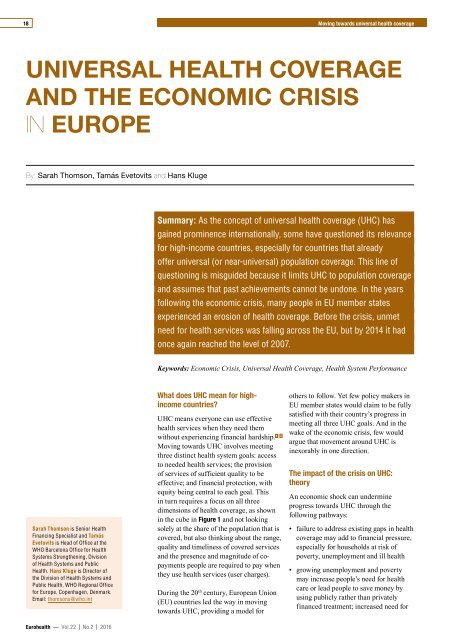EUROHEALTH
Eurohealth-volume22-number2-2016
Eurohealth-volume22-number2-2016
Create successful ePaper yourself
Turn your PDF publications into a flip-book with our unique Google optimized e-Paper software.
18<br />
Moving towards universal health coverage<br />
UNIVERSAL HEALTH COVERAGE<br />
AND THE ECONOMIC CRISIS<br />
IN EUROPE<br />
By: Sarah Thomson, Tamás Evetovits and Hans Kluge<br />
Summary: As the concept of universal health coverage (UHC) has<br />
gained prominence internationally, some have questioned its relevance<br />
for high-income countries, especially for countries that already<br />
offer universal (or near-universal) population coverage. This line of<br />
questioning is misguided because it limits UHC to population coverage<br />
and assumes that past achievements cannot be undone. In the years<br />
following the economic crisis, many people in EU member states<br />
experienced an erosion of health coverage. Before the crisis, unmet<br />
need for health services was falling across the EU, but by 2014 it had<br />
once again reached the level of 2007.<br />
Keywords: Economic Crisis, Universal Health Coverage, Health System Performance<br />
Sarah Thomson is Senior Health<br />
Financing Specialist and Tamás<br />
Evetovits is Head of Office at the<br />
WHO Barcelona Office for Health<br />
Systems Strengthening, Division<br />
of Health Systems and Public<br />
Health. Hans Kluge is Director of<br />
the Division of Health Systems and<br />
Public Health, WHO Regional Office<br />
for Europe, Copenhagen, Denmark.<br />
Email: thomsons@who.int<br />
What does UHC mean for highincome<br />
countries?<br />
UHC means everyone can use effective<br />
health services when they need them<br />
without experiencing financial hardship. 1 2<br />
Moving towards UHC involves meeting<br />
three distinct health system goals: access<br />
to needed health services; the provision<br />
of services of sufficient quality to be<br />
effective; and financial protection, with<br />
equity being central to each goal. This<br />
in turn requires a focus on all three<br />
dimensions of health coverage, as shown<br />
in the cube in Figure 1 and not looking<br />
solely at the share of the population that is<br />
covered, but also thinking about the range,<br />
quality and timeliness of covered services<br />
and the presence and magnitude of copayments<br />
people are required to pay when<br />
they use health services (user charges).<br />
During the 20 th century, European Union<br />
(EU) countries led the way in moving<br />
towards UHC, providing a model for<br />
others to follow. Yet few policy makers in<br />
EU member states would claim to be fully<br />
satisfied with their country’s progress in<br />
meeting all three UHC goals. And in the<br />
wake of the economic crisis, few would<br />
argue that movement around UHC is<br />
inexorably in one direction.<br />
The impact of the crisis on UHC:<br />
theory<br />
An economic shock can undermine<br />
progress towards UHC through the<br />
following pathways:<br />
• failure to address existing gaps in health<br />
coverage may add to financial pressure,<br />
especially for households at risk of<br />
poverty, unemployment and ill health<br />
• growing unemployment and poverty<br />
may increase people’s need for health<br />
care or lead people to save money by<br />
using publicly rather than privately<br />
financed treatment; increased need for<br />
Eurohealth — Vol.22 | No.2 | 2016
















